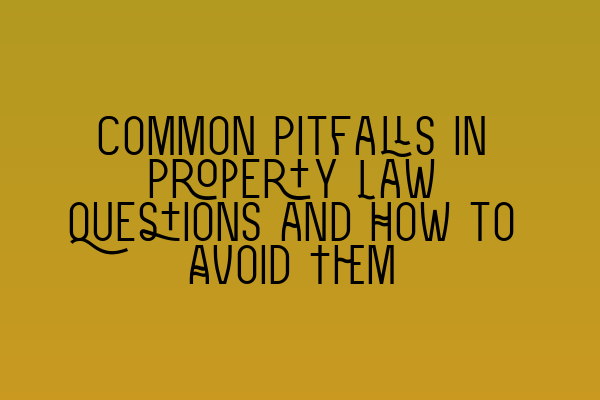Common Pitfalls in Property Law Questions and How to Avoid Them
Welcome to the SQE Property Law blog! As solicitors, it is our duty to guide and assist you in navigating the complexities of property law. In this article, we will delve into some common pitfalls that students often encounter when answering property law questions and provide you with valuable insights on how to avoid them. Whether you are a student preparing for the SQE exam or a professional seeking a deeper understanding of property law, this article will equip you with the knowledge you need to excel.
1. Failure to Identify the Legal Principles
One of the most common mistakes students make is failing to identify and understand the legal principles that apply to a specific property law question. It is crucial to thoroughly review the key legal concepts, statutes, and case law relevant to the topic at hand. By doing so, you will be better equipped to analyze the facts and apply the correct legal principles to arrive at a well-substantiated answer.
To gain a deeper understanding of contract law, including the concept of misrepresentation, we recommend reading our article on Misrepresentation in Contracts: Unveiling Deceptive Practices.
2. Inadequate Analysis of the Facts
Another pitfall to avoid is providing an incomplete or superficial analysis of the facts presented in the question. It is essential to carefully read and understand all the given information, identifying any relevant details, parties involved, and legal implications. Take the time to consider the different perspectives of the parties and evaluate the potential consequences of their actions.
If you are interested in exploring the SQE contract law syllabus in more detail, check out our article: A Closer Look at SQE Contract Law Syllabus.
3. Failure to Apply the Law to the Facts
Mere knowledge of legal principles is not enough. To demonstrate your understanding and application of property law, it is essential to effectively apply the law to the given facts. Clearly identify which legal principles are relevant to the case and explain how they apply to the specific scenario provided. It is crucial to provide well-reasoned arguments supported by applicable statutes and case law.
In analyzing important cases and influential judicial decisions, our article SQE Contract Law: Analyzing Landmark Cases and Influential Judicial Decisions can offer valuable insight.
4. Neglecting Alternative Perspectives
Property law often involves complex disputes, and there are usually multiple perspectives to consider. Avoid the pitfall of solely focusing on one party’s viewpoint. Instead, explore alternative perspectives and arguments that may arise. This demonstrates critical thinking skills and a comprehensive understanding of the subject matter.
To gain a better understanding of contractual capacity and its limitations, we recommend reading our article on Understanding Contractual Capacity: Rights and Limitations.
5. Lack of Attention to Detail
In property law, every word and detail matters. As you answer property law questions, pay close attention to the language used in the question and ensure that your answer reflects a precise understanding of the facts. Small nuances in the wording can significantly impact the legal analysis and the ultimate conclusion. Therefore, take the time to carefully review both the question and your answer for accuracy.
As you prepare for the SQE exams, make sure to test your knowledge with our interactive mock tests for contract law: Interactive SQE Mock Tests for Contract Law: Test Your Knowledge.
Conclusion
Avoiding common pitfalls in property law questions is crucial to achieving success in your studies and future career. By understanding the legal principles, thoroughly analyzing the facts, applying the law correctly, considering alternative perspectives, and paying attention to detail, you can enhance your problem-solving abilities and excel in property law. Remember to always back up your answers with relevant statutes and case law, providing well-substantiated arguments to support your conclusions.
For further guidance and assistance with your property law journey, SQE Property Law & Land Law Solicitors are here to help. Contact us today to benefit from our expertise and experience.
